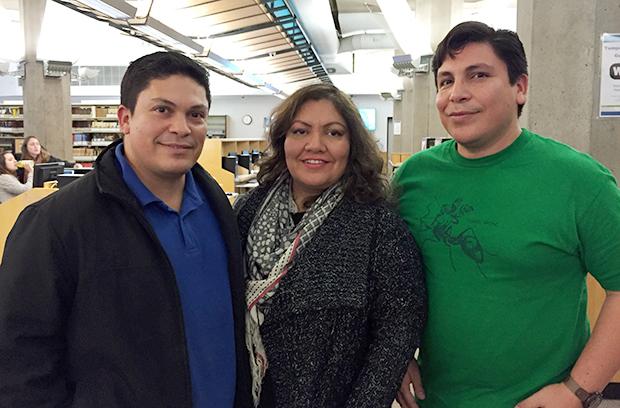Three siblings, one passion: helping children
Working as a Special Education Assistant is a challenging—and rewarding—job. Sometimes, you literally spend your days running.

Nancy Trigueros remembers one such experience while working as a Special Education Assistant at a previous place of employment. A young client diagnosed with autism would have anxiety attacks. "My team would have to run after her in the hallways," says Nancy.
But, after one year of applying carefully-measured behavioural intervention techniques, Nancy was able to see the difference it makes for this student.
"The problem behaviour wouldn't allow her to learn," she says. "Now, she's doing all these things—she sits in every class!"
Small victories are what keep Nancy going forward in this challenging and under-resourced profession.
As a graduate of Capilano University's Bachelor of Applied Behaviour Analysis (ABA) program, Nancy now spends most of her time working with kids with autism at St. Thomas Aquinas Regional Secondary School in North Vancouver. Two of her siblings, brothers Sam and Rocco, have also joined Capilano University's ABA program, making the study of Applied Behavioural Analysis a family affair.
A family tradition
For Nancy and her family, this type of work resonates close to home, since her own niece has autism.
"We never thought it could happen," she says, "but it did." She adds that in general, rates of autism diagnosis are higher now than in the past.
Nancy graduated from Capilano University's ABA program a year ago, and then recommended it to her brothers, Sam and Rocco, who are also enrolled in the program.
Sam, who currently takes classes in the program part time, says taking Applied Behaviour Analysis was a logical next step for him, in keeping with the path of the rest of the Trigueros family.
"We're a close family—people might think it's kind of weird seeing three siblings doing the same field," acknowledges Sam. "But, I think in general, it's because we have a tradition of being community helpers."
Before the Trigueros family moved from Mexico in the 1990s, Sam's father was a medical doctor and his mother was a social activist who ran a language school in Mexico.
"Two of my sisters are also nurses, and my youngest brother is a medical doctor," he adds.
Sam himself was in medical school before coming to Canada. When he couldn't get his academic credentials recognized, he decided to switch career paths—a move that eventually lead him to the ABA program.
What is Applied Behaviour Analysis?
The ABA program provides students with the theoretical and practical tools they need to help improve the lives of families who require the services of professionals in behaviour analysis—the process of applying learning theory to teach new skills and reduce problem behaviours for those diagnosed with Autism Spectrum Disorders.
It's currently estimated that one in every 68 children meet the diagnostic criteria for Autism Spectrum Disorder.
Applied behaviour analysis is the only scientifically-validated treatment that has been shown to be effective in the treatment of autism.
Balancing theory and practice
Nancy and Sam's brother, Rocco, is just about to enter the first of his three practicum terms within the ABA program.
Rocco, a former youth worker, says the program is rigorous and puts a heavy emphasis on practical application.
"You have to do 300 hours of community help," he says. "That's the way to know if this is the field you want."
Rocco also says he is getting the "best of the best" in his education at Capilano.
"The teachers are leading [practitioners] in the field," he said. "They share with us experiences and cases. We get to learn not only the theory, but also through the experiences of these people."
Nancy says there is a great need to address problem behaviours in children with a behavioural approach, as opposed to just medication. In fact, she says that parents at schools are even specifically requesting professionals in behaviour analysis.
"It's more preferred, from my perspective, than medicating kids," she says. "They want something that is evidence-based. This is a field where you'll never run out of work."
Submitted by: Communications & Marketing
